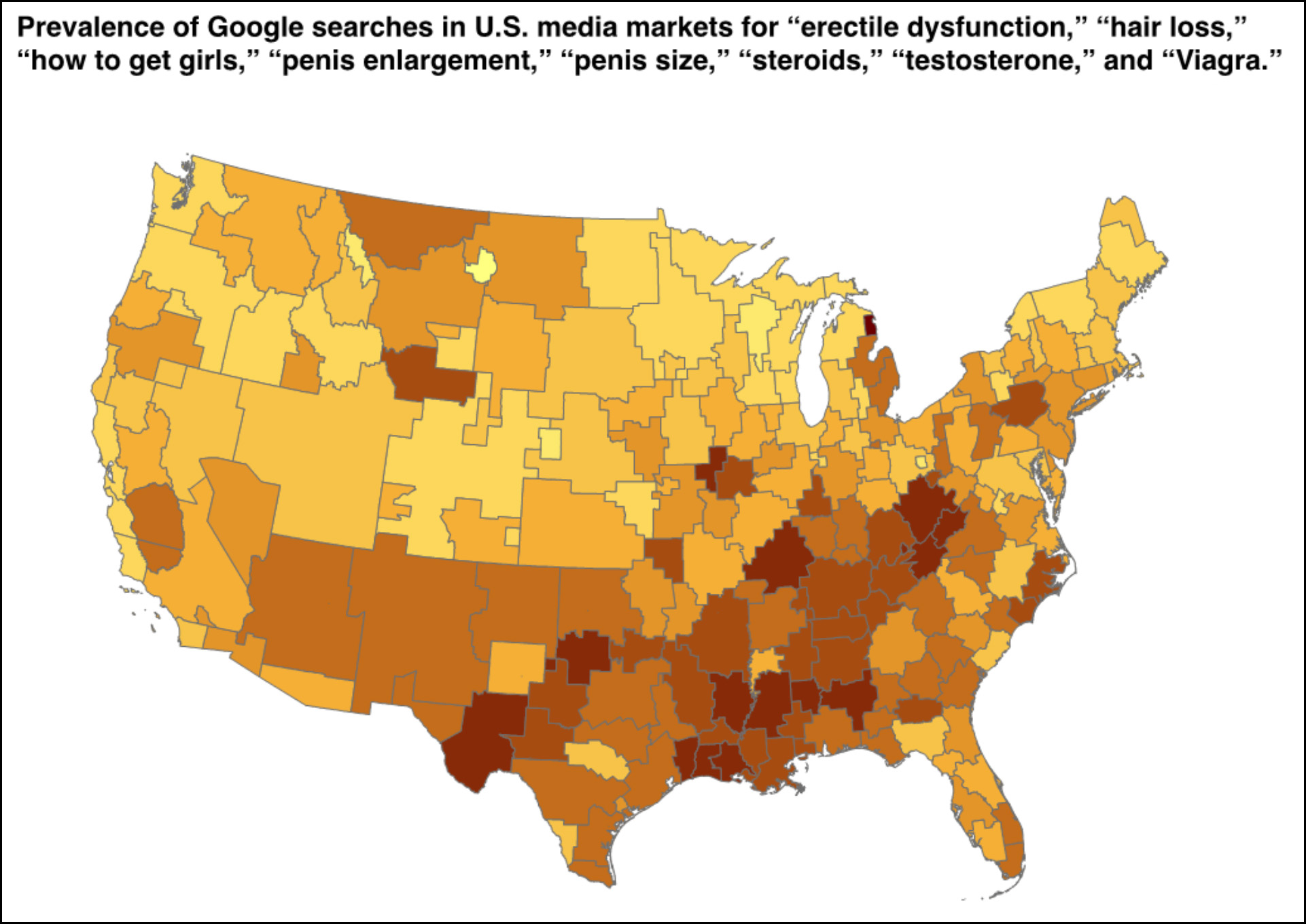This map from the Washington Post made the gleeful rounds of liberal Twitter yesterday:

What’s not to like? It shows that all those supposedly manly Southern men aren’t so manly after all. In fact, they’re desperately searching Google for ways to make themselves more manly, and it’s hard for us lefties not to get a chuckle out of that. To make it even better, the accompanying study also showed that all these insecure men voted for Donald Trump in large numbers.
But it seemed sort of dumb to me and I had no plans to write about it: the fact that Southern men voted for Trump in large numbers is hardly news, after all. But then, thanks to the Evil Dex, I had lots of time on my hand and I read the whole piece. It’s written by Eric Knowles and Sarah DiMuccio, who conducted the research:
We found that support for Trump in the 2016 election was higher in areas that had more searches for topics such as “erectile dysfunction.” Moreover, this relationship persisted after accounting for demographic attributes in media markets, such as education levels and racial composition, as well as searches for topics unrelated to fragile masculinity, such as “breast augmentation” and “menopause.”
OK. Not surprising so far. Tell me more.
In contrast, fragile masculinity was not associated with support for Mitt Romney in 2012 or support for John McCain in 2008 — suggesting that the correlation of fragile masculinity and voting in presidential elections was distinctively stronger in 2016.
The same finding emerged in 2018….In the more than 390 House elections pitting a Republican candidate against a Democratic candidate, support for the Republican candidate was higher in districts that, based on Google search data, had higher levels of fragile masculinity. However, there was no significant relationship between fragile masculinity and voting in the 2014 or 2016 congressional elections. This suggests that fragile masculinity has now become a stronger predictor of voting behavior.
Huh. I was uninterested at first because I figured the Trump effect was really just a Republican effect. But no. Insecure men voted in unusually large numbers for the Republican candidate only when that candidate was Trump. And two years later, the effect was still there in a midterm election that was heavily dominated by Trump’s presence.
If this holds up, it suggests that Trump really did appeal to a kind of toxic masculinity in a way that other Republicans haven’t. I suppose that’s not entirely surprising either, but it was just something we all assumed. We’ve not had real evidence of it before.
And it’s interesting in a non-snarky way, too. There’s something about it that’s sort of a mirror image of this whole “deaths of despair” theory, which is mostly driven by rural whites.¹ If it’s true, it’s quite possible that it’s galvanized mostly by factors that affect the self-image of men who have grown up thinking that stereotypical manliness was a core part of who they had to be. Inability to be a good breadwinner would certainly be part of that. Being the “losers” of the feminist movement would be part of it. Being forced to give up their traditional control of family and sex—no more demands, no more casual harassment—would be part of it. A candidate who explicitly appealed to this frustration and promised to fix it—which neither Romney nor McCain did—would attract their votes. Especially if he were running against that shrill harpy Hillary Clinton.
Long story short, this is interesting to the extent that it shows who Trump specifically appealed to above and beyond normal Republican candidates. It’s also something for Democrats to give some serious thought to, even if, like Trump, they currently have few real solutions to offer. I’m not sure what a “real” solution might be, but it’s worth noting that one thing it’s not is an insistence on nominating a man in 2020. Although the authors found that insecure men might like Trump, they held no grudge against women running for office: “Notably, fragile masculinity was unrelated to support for female candidates in the 2018 elections.” That means we can feel free to nominate anyone we want. It just needs to be someone who knows how to talk to insecure men.
¹I’m not entirely sold on the deaths-of-depair theory, but there’s certainly some evidence for it


















